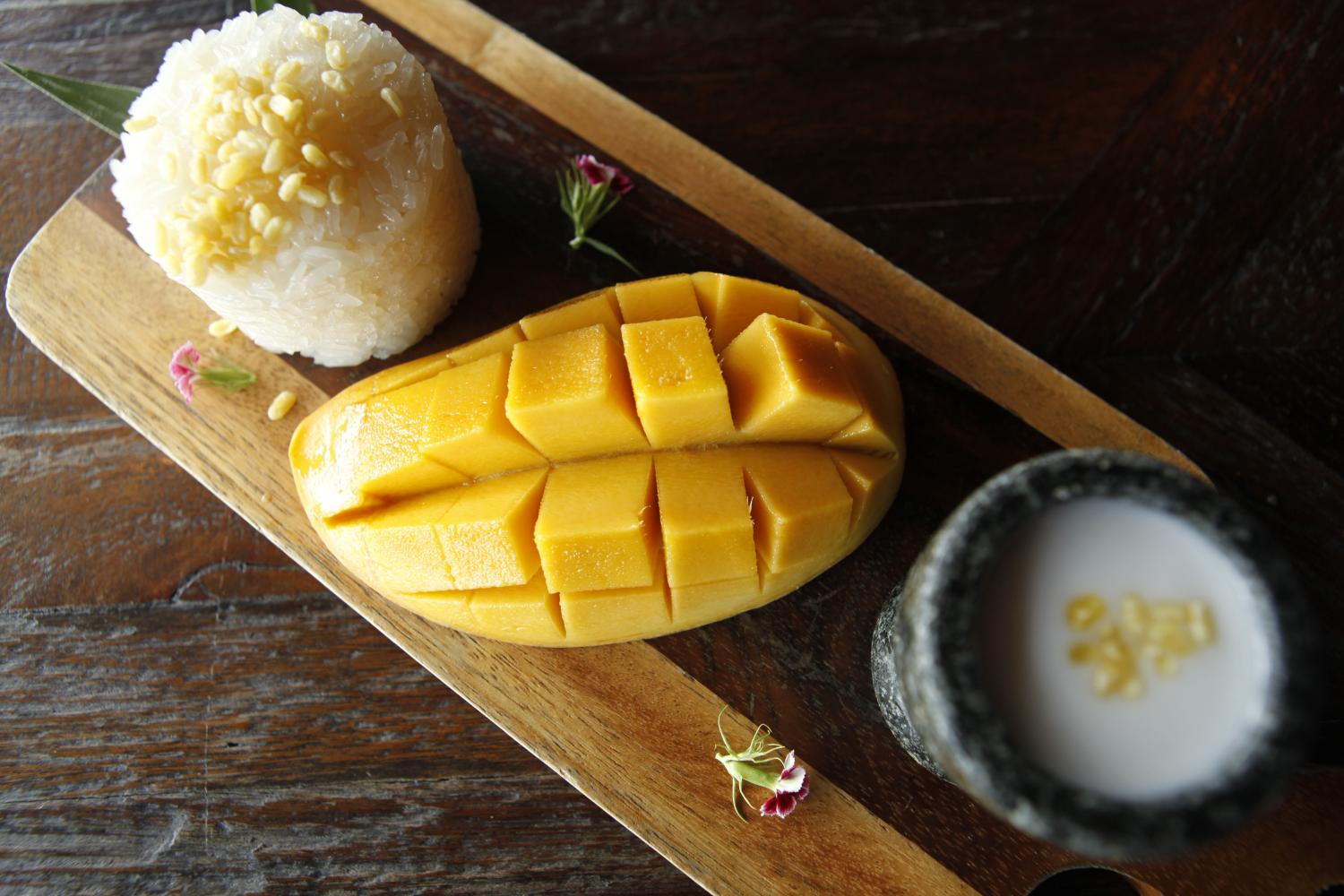
Though Thailand faces gloomy economic prospects with a surge in inflation, higher energy prices and persistent Covid outbreaks, a performance by Thai rapper Danupha "Milli" Khanatheerakul at the Coachella Festival in California that was capped by her eating khao nieo mamuang (mango sticky rice) on stage went viral on social media, reigniting buzz over the influence of soft power.
Many say the episode offers hope for a new boost to the country's exports, helping to shore up the fragile economy.
Even Prime Minister Prayut Chan-o-cha, who filed a defamation charge against the teen rapper in June last year following social media complaints about his mismanagement of the pandemic, jumped on the bandwagon and announced the Culture Ministry may propose mango sticky rice as a Thai cultural heritage item with Unesco.
The Commerce Ministry said it is ready to promote soft power on the international stage based on Thailand's unique culture, food and quality tourism in order to capitalise on the popularity of Milli's performance to increase shipments of Thai fruit and food.

Traders sort out ripe mangoes at Simummuang Market in Pathum Thani. Demand for the fruit has jumped since rapper Danupha 'Milli' Khanatheerakul ate mango sticky rice on stage at the Coachella Festival in the US. Apichit Jinakul
Soft power has long been a preoccupation of Thai leaders. Last October there was buzz after Thai-born singer Lalisa "Lisa" Manobal, a member of South Korea's K-pop group Blackpink, featured Phanom Rung stone castle and Thai craftsmanship in a music video for the first single from her debut solo album Lalisa.
The eponymous single has amassed more than 466 million views on YouTube since its release on Sept 10, 2021.
However, there is scepticism regarding the government's efforts to promote Thai soft power and whether the country can succeed in developing that power to help improve exports and an economic recovery.
SERIOUS MISSION NEEDED
"Milli's mango sticky rice ploy was a creative gimmick, but it is a pity that amid the contagion, farmers and exporters cannot sell as much as they should because the government has yet to seriously promote mango sticky rice," said Upathum Nisitsukcharoen, president of the Event Management Association.
More importantly, mango sticky rice is available only at Thai restaurants, limiting its availability. He suggested promoting ready-to-eat mango sticky rice overseas via supermarkets.

Mango sticky rice is listed as one of CNN's 50 greatest desserts around the world.
Mr Upathum said the government agency that handles soft power strategy or the Tourism Authority of Thailand should set up an independent unit with young staff to tout Thai products via online channels.
He also suggested connecting with international social media influencers or celebrities to generate publicity for mango sticky rice and other Thai dishes.
STRATEGY REJIG A MUST
Kitti Siripallop, associate professor at Thammasat Business School, said the buzz about Milli eating mango sticky rice on the international stage helped build awareness for Thai brands.
He recommended the government cash in on the hype by promoting mango sticky rice at Thai restaurants abroad and introduce different types of Thai mangoes to foreigners.
"In the digital era, the government should focus on creating key opinion leaders [KOLs] as part of the country's global marketing strategy to draw people's interest," Mr Kitti said.
Other than mangoes, various Thai products can be promoted abroad, especially traditional textiles, he said.
KOLs are people or organisations that have such a strong social status their recommendations or opinions are listened to when people make important decisions.
Thai fabrics, for instance, could be promoted by Thai actresses on the red carpet at international film festivals. The government could join hands with international fashion brands to promote Thai clothes or fabrics on catwalks, said Mr Kitti.
He suggested promoting Thai products via different channels such as music, films, TV shows and sports to tap different customer segments.
CULTURAL AMBASSADORS
Kriengkrai Thiennukul, chairman of the Federation of Thai Industries (FTI), said singers can act as cultural ambassadors, helping the government to deploy soft power to promote and market Thai products globally.
"Milli and Lisa have made Thailand more recognisable in the world, which so far mainly knows the country through tourism, food and culture," he said.
Mr Kriengkrai said the singers reminded him of a similar tactic used to promote Starbucks coffee shops.
"Tom Hanks and Meg Ryan, who starred in Sleepless in Seattle, met at Starbucks. That made the coffeehouse more widely known across the world," he said. "If we can generate world fame for Thai culture, we will get a further boost."
Introducing foreigners to Thainess and familiarising them with Thai cultural products can benefit various businesses, said Mr Kriengkrai.
Milli and Lisa are a good start to promoting Thailand, but the government must do more by building a link with Thai industries, said Supant Mongkolsuthree, honorary chairman of the FTI.
The two artists can increase sales of other Thai products, which will eventually help support the Thai economy, he said.

Lalisa Manobal made her solo debut with her single album Lalisa in September 2021.
CHARACTER AND NFT OPENING
Lak Taechawanchai, vice-president of the Digital Council of Thailand, said the foreign developer of the Street Fighter video game based one of the characters on a real Muay Thai boxer, which demonstrates how Thai soft power can be displayed to the world.
He said Thailand can build soft power through films and TV series by working with over-the-top platforms, such as Netflix, to make original content by hiring local production houses and filming in Thailand.
This formula has been successful with Korean dramas, with one episode of a TV series capturing hundreds of millions of baht in investment from Netflix, said Mr Lak. Netflix, meanwhile, spends only 20 million baht for a Thai series.
He said the rise of the metaverse and non-fungible tokens (NFTs) in the digital world can also help drive Thai soft power. The burgeoning digital realm opens the door for game developers, animation creators and graphic designers to showcase their work in the metaverse.
Thailand can develop its own NFT-based games to help boost the country's tourism and revenue, said Mr Lak. For example, the country could enable foreign tourists to collect digital tokens that can be used to purchase Thai products in the metaverse, he said.
The country can also promote sports like Muay Thai in the digital realm, said Mr Lak. Renowned Muay Thai fighter and kickboxer Buakaw recently unveiled "Buakaw 1" NFT, which features the digital art of Buakaw.
The project, which announced only 10,000 NFTs are available, gives members access to the club's exclusive privileges, merchandise and roadmap activation.
UNDERUTILISED
Sanan Angubolkul, chairman of the Thai Chamber of Commerce, lauded Milli for displaying mango sticky rice on stage at a famous festival. In addition to pop music, movies and other forms of soft power could play a key role in driving the Thai economy, he said.
"South Korea has used creative industries to drive economic growth, enhancing selling points such as tourism, food and digital content," said Mr Sanan.
"Thailand is ready in every aspect. I think it's time for us to pay more attention to promoting the creative economy to generate growth. In addition to mango sticky rice, we have other popular Thai dishes such as tom yum gung. We also have traditional massage, Thai boxing and folk songs, but they remain underutilised."
He said the private sector and government agencies should work together to enhance soft power development and create added value through the export of creative content such as music, dramas and movies. More open platforms need to be created to further develop Thailand's soft power, said Mr Sanan.
POWER OF GASTRONOMY
Tourism Authority of Thailand governor Yuthasak Supasorn said his agency has used Thai cuisine as a tourism product to represent the image of the country and attract global travellers.
Promoting Thailand's gastronomic culture helps to support producers of local ingredients as tourists are interested in knowing more about the sources of those products.
He said Milli's mango sticky rice ploy provides an ideal opportunity to create wider recognition for Thai cultural products.
Mango sticky rice is already listed among CNN's 50 greatest desserts around the world. The next challenge is to introduce more dishes to travellers, Mr Yuthasak said.
SLIGHT BOOST
Paiboon Wongchotesathit, president of the Thai Fresh Fruit Traders and Exporters Association, said the Milli phenomenon is unlikely to be a big help to mango exports this year, citing lower domestic supply of the nam dok mai variety as well as existing mangoes being too ripe to export as hot weather makes mangoes ripen faster.
However, Mr Paiboon acknowledged the event is good for the domestic market as it helps stimulates mango consumption, even if some foreigners remain unaware of the dish.
"At least Thailand can cash in on this event to promote Thai mango," he said.